#vitamin B complex deficiency symptoms
Text
The Top 10 Health Benefits of Vitamin B Complex Pro!
The Top 10 Health Benefits of Vitamin B Complex Pro!
Vitamin B Complex PRO is a supplement that contains a combination of B Vitamins, including B1, B2, B3, B5, B6, B7, B9, and B12. It can help support energy production, metabolism, and cognitive function. It also helps promote healthy skin, hair, and nails. Vitamin B Complex PRO is suitable for those who are looking to increase their intake of B vitamins or those who are deficient in one or more of…
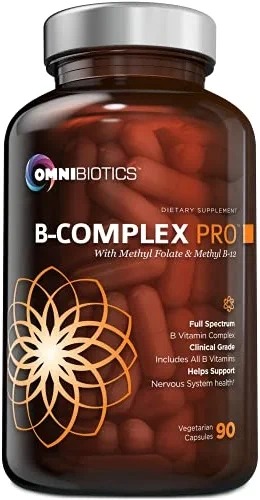
View On WordPress
#b complex#b12 deficiency#folic acid#health and wellness#nutrition#supplements#vitamin#vitamin b#vitamin b12#vitamin b12 deficiency#vitamin b12 deficiency symptoms#vitamin b12 foods#vitamin b6#vitamin c#vitamin d#vitamins
11 notes
·
View notes
Note
I was diagnosed with ADHD by my uni (and am having to wait 50 million years for an NHS diagnosis), so I'm wondering if b12 would help, but I had my bloods done a few months back (have some weird health problems, get regular blood tests), and both my b12 and folic acid are within the normal range apparently. The NHS seems to use different units than American healthcare tho. Idk if you've ever been in a similar situation, but do you think b12 would help even though I apparently don't need it? Apparently anxiety also messes with b12, and I have panic disorder, but still, normal blood test results
I can only speak from my own experience, but even when my numbers are in the "acceptable" range, I suffer the mental symptoms of having a deficiency. It's only when my numbers are at the absolute top range that I feel adequately alert. Obviously, I've got some unique problems going on, and I'm not saying that's true of everyone, I'm just saying a lot of my brain fog and other cognitive problems were ignored for decades because my numbers were "acceptable."
That said, it might be advisable to take a B complex or something of the like just to make sure you're getting enough of them. There's been some ongoing research about ADHD being linked to lower levels of B2, B6, and a few others.
Obligatory check with a doctor before starting any new medications or supplements, but taking a B complex is generally considered safe because B vitamins are water soluble, and whatever your body doesn't need, it flushes out. Basically, it may or may not help, it really depends on your own body. But it likely wouldn't hurt to try?
336 notes
·
View notes
Text
Managing IBS After a Stressful Period and Gallbladder Removal: The Power of Supplements and nature
Living with Irritable Bowel Syndrome (IBS) can be challenging, especially after experiencing a long and stressful period in life, coupled with the removal of the gallbladder. It took me two years to finally start managing the flare ups that have become my daily struggle in the past two years since i had my surgery. However, there is hope in managing IBS symptoms and finding relief. In this blog post, I will explore the benefits of specific supplements, such as omega-3, zinc, B-complex, B1, vitamin D, and magnesium citrate, and how they can help alleviate IBS flare-ups over time.
Omega-3 fatty acids are essential for overall health and have been found to have anti-inflammatory properties. In the context of IBS, omega-3 can help reduce inflammation in the gut, which is often associated with flare-ups. Incorporating omega-3 supplements into your daily routine can potentially improve IBS symptoms, such as abdominal pain, bloating, and diarrhea. Adding the omega in my supplement routine made a huge difference in my overall health.My gut is happy.
Zinc is a vital mineral that plays a crucial role in various bodily functions, including digestion and immune system support. Studies have shown that individuals with IBS may have lower zinc levels, which can contribute to worsened symptoms. By supplementing with zinc, you can potentially restore the balance and alleviate IBS-related discomfort. The pharmacist suggested it to me several months ago calling it the supplement of the future. It helps with the healing and inflammation and enhances the benefits the other supplements are providing.
B vitamins, particularly B-complex, are essential for maintaining optimal gut health. These vitamins help convert food into energy, support the nervous system, and aid in the production of healthy red blood cells. When it comes to IBS, B-complex vitamins can help regulate digestion, reduce stress, and improve overall gut function. The one bellow I found to be the best.
B1, also known as thiamine, vitamin B1 is a crucial nutrient that supports the nervous system and helps convert carbohydrates into energy. In the context of IBS, B1 can help alleviate symptoms such as fatigue, brain fog, and digestive issues. By supplementing with B1, individuals may experience improved energy levels and reduced IBS-related discomfort. It is also very effective if you are diagnosed with SIBO.
Vitamin D is not only essential for bone health but also plays a role in immune function and inflammation regulation. Studies have suggested a potential link between vitamin D deficiency and IBS symptoms. By ensuring adequate vitamin D levels through supplementation, individuals may experience reduced inflammation and improved IBS symptoms. My doctor measured my vitaamin D levels which were a bit on the low side and supplemented me with 5000u of vitamin D.
Magnesium is a mineral that plays a vital role in muscle relaxation and nerve function. In the context of IBS, magnesium citrate can help alleviate constipation, a common symptom experienced by individuals with IBS. By promoting regular bowel movements, magnesium citrate can provide relief and improve overall gut function. The Magnesium Citrate is gentle on the stomach lining and thats why this is the one that is recommended.
Digestive enzymes play a crucial role in our overall digestive health. These enzymes are responsible for breaking down the food we eat into smaller, more easily absorbable molecules that our body can utilize for energy and nourishment. Without sufficient digestive enzymes, our body may struggle to properly digest and absorb nutrients, leading to various digestive issues.
Digestive enzymes can help alleviate the symptoms of IBS by aiding in the breakdown of food and improving digestion. They can help break down complex carbohydrates, proteins, and fats, reducing the strain on the digestive system and minimizing discomfort. Additionally, digestive enzymes can enhance nutrient absorption, ensuring that the body receives the necessary vitamins, minerals, and other essential nutrients.
There are different types of digestive enzymes, each targeting specific types of food molecules. For example, amylase helps break down carbohydrates, protease aids in protein digestion, and lipase assists in the breakdown of fats. By supplementing with these enzymes, individuals with IBS can support their digestive system and control the flare ups.
In addition to incorporating digestive enzymes there are also benefit from making dietary and lifestyle changes. This may include following a low-FODMAP diet, which eliminates certain types of carbohydrates that can trigger IBS symptoms. Regular exercise, stress management techniques, and adequate hydration are also important for maintaining a healthy digestive system.
In conclusion, digestive enzymes play a vital role in supporting digestive health, and they can be particularly beneficial for individuals with IBS. By aiding in the breakdown of food and improving nutrient absorption, digestive enzymes can help alleviate symptoms and improve overall well-being. However, it’s essential to work with a healthcare professional to determine the appropriate use and dosage of digestive enzymes, as part of a comprehensive treatment plan for IBS.
Psyllium is a soluble fiber derived from the seeds of the Plantago ovata plant. It is commonly used as a dietary supplement and is known for its ability to promote regular bowel movements and relieve constipation. In the context of IBS, psyllium can help regulate bowel movements, reduce diarrhea, and alleviate abdominal discomfort. The fiber in psyllium absorbs water in the intestines, adding bulk to the stool and promoting healthy digestion. Additionally, psyllium can help regulate gut motility and improve overall gut health, which can be beneficial for individuals with IBS.
Managing IBS after a long stressful period and gallbladder removal can be challenging, but incorporating specific supplements into your daily routine can make a significant difference. Omega-3, zinc, B-complex, B1, vitamin D, and magnesium citrate all offer potential benefits in alleviating IBS symptoms over time. However, it is important to consult with a healthcare professional before starting any new supplement regimen to ensure it is safe and suitable for your individual needs. Remember, finding relief from IBS is a journey, and with the right approach, you can regain control of your digestive health and improve your overall well-being.
Remember, managing IBS requires a comprehensive approach that may include dietary modifications, stress management, and other lifestyle changes in addition to potential supplements or treatments.
Good luck.🪷
2 notes
·
View notes
Text
guide to vegan vitamin b 12
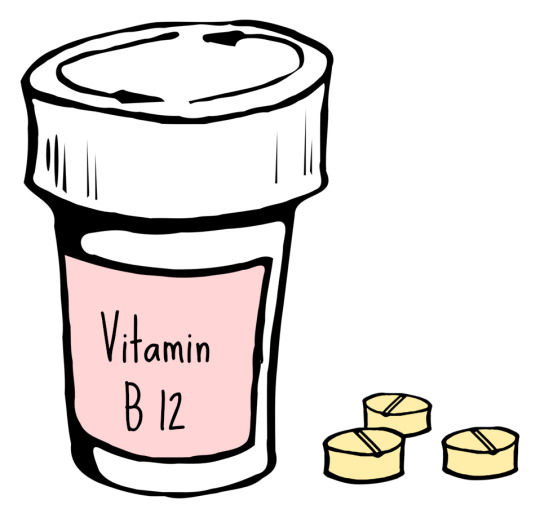
Vitamin B12 deficiency is a topic that comes up often when people talk about veganism. But it is quite easy to maintain a healthy level of Vitamin B12 on a plant – based diet.
This is often due to limited dietary intake, malabsorption, medical conditions, or the use of B12-depleting medications.
Vitamin B12 is the by-product of bacterial activity - a process that only takes place in the digestive system of animals. Therefore, the nutrient is not found in plant-based foods. The only reliable sources of vitamin B12 on a plant-based diet are fortified foods and drinks or supplements.
signs and symptoms of vitamin b 12 deficiency
1. Fatigue
2. Pale or yellow skin
3.Headaches
4. A greater risk of developing depression
5. Pale or yellow skin
6. Gastrointestinal issues
7. Difficulty concentrating and mental impairment
8. Pain and inflammation of the mouth and tongue
9. The corners of the mouth are split.
10. Pins and needles in hands and feet
11. Muscle cramps and muscle weakness.
reliable sources of vegan b 12
Fortified foods & drinks: L
Look for plant milks, non – dairy yoghurts, breakfast cereals, spreads, yeast extracts, tofu and nutritional yeast products that are fortified with vitamin B 12.
Supplements:
Vitamin B1 2 supplements should be taken as part of a B-complex supplement, and ideally together with a multi – vitamin.
Vitamin B 12 injections:
These are inexpensive and effective.
With thanks to The Vegetarian Resource Group, The Vegan Society & Happy Cow.
Image found on Pinterest. No source.
#vegan#veganism#go vegan#vegan supplements#plant based supplements#vitamin b 12#plant based vitamin b 12
8 notes
·
View notes
Text
Good Solid Advice About Vitamins And Minerals That Anyone Can Use
Success in health is something elusive to many. They may start to eat a cleaner diet and even work out a few times per week, but they never feel they've achieved optimal health. What they are missing is vitamins and minerals, and the following tips and tricks should help you learn about this topic.
Thiamine, or vitamin B1, deficiency can cause neurological and psychiatric symptoms. These symptoms can include weight loss, weakness, irregular heart rate and psychosis. A vitamin B complex can ensure you receive the vitamin B1 you need, or you can eat pork, brown rice, liver, oatmeal, leafy vegetables, eggs and potatoes.
Never ignore the product warnings on vitamin levels. Vitamin and supplements can have serious side effects when taken with prescription and over the counter medicines. Ginseng can be very dangerous if you have high blood pressure or take heart medications. Lycopene can be deadly if you have a tomato allergy. Always read the warning labels or ask your pharmacist or doctor before taking any vitamins or supplements.
Two of the best sources for vitamin D are exposure to the sun and milk. If you are not a big milk drinker or do not spend a lot of time in the sun, you should take a supplement with vitamin D. Vitamin D protects your bones and keeps them from becoming brittle.
Although all vitamins and minerals are important, some are even more important for growing children. When planning your child's diet, make sure they are getting enough vitamins A, C and D, as well as the B vitamins. Calcium and iron are also very important for your growing children's bodies.
Magnesium is necessary for over 300 chemical reactions in the body. Foods high in fiber contain magnesium, including legumes, vegetables, nuts and whole grains. This mineral is used to treat high cholesterol, ADHD, fatigue, migraines, PMS and multiple sclerosis. Magnesium can also be applied topically to speed up healing.
As stated in the above article, taking vitamins and minerals is an important part of anyone's life who wants to maintain a healthy lifestyle. Now that you read some good tips about this subject there is no reason for you not to start on a healthier path. Keep at it and remember how important it is for your life to be healthy.
Read more here https://www.colourlovers.com/lover/vigrxofcstore
3 notes
·
View notes
Text

@onlinesnoopy answering this as a post
this is hard to answer bc theres so many chemicals out there. for me i just noticed issues were popping up and looked into it. i had anaemia earlier this year which made me suspicious bc i eat pretty healthy. i also started eating a lot of beetroot around this time and it was making my pee red for days. difficulty breaking down the red pigment in beetroot can be a symptom of iron deficiency.
so i took iron supplements with added folic acid as well as a b complex vitamin and started feeling absolutely fucked up. like paranoia, insomnia, lack of appetite, loss of moods in general. i stopped taking the iron one but still felt strange taking the b complex one so i knew something was up if vitamins were affecting me that intensely. b9 was in both supplements i took so i looked into issues metabolizing it specifically and found a lot of research has been done into the gene involved in its metabolism (MTHFR). i looked into that pathway more and found studies linking mutations there to genetic disorders my mum has.
so? my best advice is to take lots of different chemicals then see what happens. and then work it out from there. bonus points if you know of any genetic diseases in your family. and also basic knowledge of biochemical processes helps too
10 notes
·
View notes
Text
Nervous System: Exploring B1, B6, and B12 Vitamins | Neurobion
0 notes
Text
FINALLY a medical test comes back positive! I may have actually found the explanation for my ever-worsening health!
who knew low vitamin B-12 levels could cause THIS much pain!
hopefully the dr responds soon with either requests for more testing or just a prescription for the stuff- i have a big even this weekend and would like to not feel like im dying, and taking over the counter B-complex isnt doing much.
also hopefully there's nothing serious causing this, but I don't think so- I have literally every risk factor:
-on-and-off episodes of anemia
-family history of vitamin b issues
-chronic GI condition
FUCK I hope this is finally it. I really REALLY hope that this is The Solution. all the health issues I'm having ARE absolutely symptoms of vitamin B deficiency. god damn. oh I hope this is it.
its a "borderline result" but thats STILL The first time a test for ANYthing has come back positive holy shittttt
#tw health issues#tw illness#tw sickness#tw health#personal#vitamin b#anyone else who's been b-deficient#does it suck this bad for all yall?
0 notes
Text
Unveiling the Health Benefits of Cashew Milk: 10 Reasons to Embrace it as Your Dairy Alternative
Cashew milk, meticulously crafted by blending cashews with water, has witnessed a surge in popularity due to its velvety texture and myriad of health advantages. In this blog, we'll delve into the top ten benefits of Cashew Milk, shedding light on why integrating it into your dietary routine can be a delectable and nourishing choice for overall well-being.
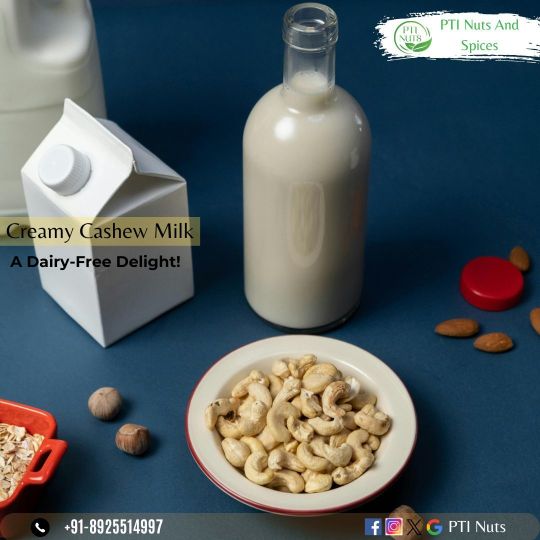
1. Assisting in Blood Clotting:
Cashew milk is rich in vitamin K, a vital nutrient essential for blood clotting mechanisms. By facilitating wound healing and fortifying cardiovascular health, ensuring adequate intake of vitamin K via cashew milk underscores its significance in your daily dietary regimen.
2. Fostering Healthy Skin Growth:
Enriched with a plethora of vitamins and antioxidants, cashew milk fosters skin vitality by stimulating collagen synthesis, alleviating inflammation, and safeguarding against oxidative stress. Regular consumption of cashew milk nurtures a supple and youthful complexion, accentuating its pivotal role in skincare.
3. Digestive Friendliness:
Unlike certain dairy products notorious for triggering digestive discomfort, cashew milk exhibits inherent gentleness on the digestive system. Tailored for individuals with sensitive digestive constitutions, cashew milk offers a creamy alternative devoid of adverse reactions.
4. Nutrient-Rich Elixir:
Cashew milk emerges as a nutritional powerhouse, bestowing essential vitamins and minerals such as vitamin E, magnesium, zinc, and B-complex vitamins. These nutritional juggernauts fortify overall health, providing a sturdy foundation for your body's vitality.
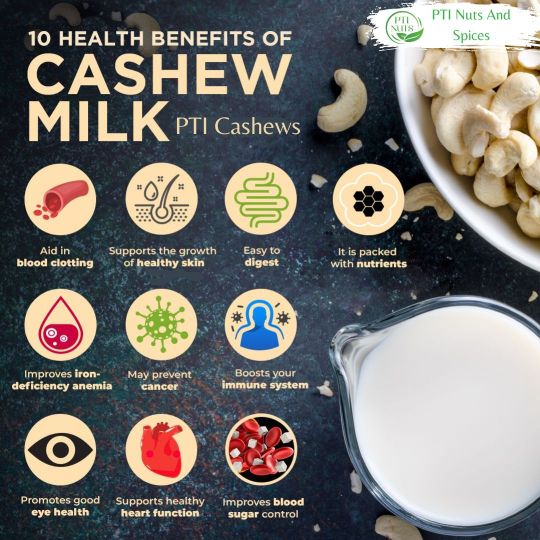
5. Combatting Iron-Deficiency Anemia:
Cashew Milk's iron content effectively combats iron deficiency, a prevalent condition leading to anemia and fatigue. By fueling hemoglobin production and red blood cell synthesis, regular consumption of cashew milk alleviates symptoms associated with iron-deficiency anemia.
6. Potential Cancer Prevention:
The antioxidant arsenal within cashew milk, highlighted by vitamin E and selenium, erects a robust defense against free radicals, thus mitigating oxidative stress. This protective shield substantially lowers the risk of cancer development, underscoring cashew milk's role in cancer prevention.
7. Boosting Immunity:
Endowed with an array of vitamins and minerals including vitamin C, vitamin E, and zinc, cashew milk acts as a potent boost to the immune system. Strengthening the body's defense mechanisms against pathogens, cashew milk fortifies immunity, ensuring resilience against infections and diseases.
8. Supporting Visionary Health:
Cashew milk's nutrient profile, encompassing vitamin E and beta-carotene, contributes to ocular health by thwarting age-related macular degeneration and cataract formation. This proactive approach to eye care underscores cashew milk's pivotal role in safeguarding vision.
9. Advocating Heart Health:
With its cholesterol-free and low-saturated fat composition, cashew milk emerges as an elixir for heart health. Augmented by potassium and magnesium, it upholds optimal blood pressure levels and sustains overall heart function, rendering it an indispensable ally in cardiovascular wellness.
10. Managing Blood Sugar Levels:
Cashew milk's low-carbohydrate content compared to cow's milk renders it a favorable option for individuals seeking to manage blood sugar levels. Enhanced by fiber and protein content, cashew milk regulates sugar absorption, thereby ameliorating blood sugar control and metabolic equilibrium.
Conclusion:
Incorporating cashew milk into your dietary repertoire unveils a plethora of health benefits, ranging from fortifying skin resilience and bolstering immune vigor to safeguarding heart integrity and optimizing blood sugar management. With its creamy texture and nutritional bounty, cashew milk transcends conventional dairy alternatives, emerging as an indispensable component of a wholesome lifestyle.
0 notes
Text
What are the best vitamins for mental health?
Several vitamins play crucial roles in supporting mental health. Here are some of the best vitamins known for their positive effects on mental well-being:
Vitamin B Complex: This group of vitamins includes B1 (thiamine), B2 (riboflavin), B3 (niacin), B5 (pantothenic acid), B6 (pyridoxine), B7 (biotin), B9 (folate), and B12 (cobalamin). They are essential for nerve function, mood regulation, and energy production.
Vitamin D: Often referred to as the “sunshine vitamin,” vitamin D plays a role in regulating mood and reducing the risk of depression. It is synthesized in the skin upon exposure to sunlight and can also be obtained from certain foods and supplements.
Vitamin C: As a powerful antioxidant, vitamin C helps combat oxidative stress in the brain and supports the production of neurotransmitters like serotonin, which is crucial for mood regulation.
Vitamin E: Another antioxidant, vitamin E protects brain cells from damage caused by free radicals and may help slow cognitive decline associated with aging.
Omega-3 Fatty Acids: While not vitamins, omega-3 fatty acids, particularly EPA (eicosapentaenoic acid) and DHA (docosahexaenoic acid), are essential nutrients for brain health. They play a role in neurotransmitter function and can help alleviate symptoms of depression and anxiety.
Magnesium: Magnesium is involved in over 300 biochemical reactions in the body, including those related to mood regulation and stress management. It may help reduce symptoms of depression and anxiety.
Zinc: Zinc is important for neurotransmitter function and may help regulate mood. Low levels of zinc have been linked to depression and anxiety disorders.
Iron: Iron deficiency can lead to fatigue, cognitive impairment, and mood disturbances. Ensuring an adequate intake of iron is important for maintaining mental well-being.
It’s important to note that while vitamins can play a significant role in supporting mental health, they should not replace professional treatment for mental health conditions. If you’re experiencing persistent mental health issues, it’s essential to seek guidance from a healthcare professional. They can help diagnose any underlying issues and recommend appropriate treatment options, which may include therapy, medication, lifestyle changes, and dietary modifications.
0 notes
Text
Cycle Serenity: Holistic Approaches to Menstrual Cramps Treatment
Understanding Menstrual Cramps
Menstrual cramps, also known as dysmenorrhea, are pains felt in the lower abdomen that can range from mild to severe. They usually happen right before or during a woman's menstrual period. The most common cause of menstrual cramps is an increase in prostaglandins, which are hormone-like substances that cause the uterine muscles to contract during menstruation. When there is an excess amount of prostaglandins, it can lead to painful cramping. Symptoms of menstrual cramps include lower abdominal pain, back pain, nausea, diarrhea, headaches, and fatigue.
Home Remedies for Menstrual Cramps
The good news is there are natural home remedies that can help provide relief from menstrual cramps and ease discomfort. Here are some of the most effective options:
Heat Therapy
Applying heat to the lower abdomen helps relax the uterine muscles and ease cramping. You can use a heating pad, hot water bottle, or take a warm bath. The heat increases blood flow to the cramped areas, counteracting the prostaglandins and relaxing tense muscles.
Massage
Massaging the lower abdomen with gentle pressure can help relax tight, cramped muscles. Use soothing oils like lavender or chamomile essential oil. Massage in a clockwise motion to relieve congestion.
Exercise
Going for a walk or doing light yoga stretches increases blood circulation and releases endorphins that counteract pain. Even mild exercise like marching in place for 10 minutes can help manage cramping. The movement gets blood flowing to relieve tension.
Medicinal Herbs
Herbs like ginger, turmeric, black cohosh, and chamomile have anti-inflammatory properties that counteract prostaglandins. Ginger tea or ginger supplements are very effective. Adding turmeric or black cohosh supplements a few days before your period starts can help prevent cramps. Chamomile tea soothes muscles and eases discomfort.
Magnesium
Magnesium deficiency can contribute to painful menstrual cramps. Eating more magnesium-rich foods like pumpkin seeds, edamame, cashews, and leafy greens or taking a magnesium supplement can help relax muscles. Topical magnesium oil applied to the abdomen also penetrates skin to calm cramps.
Vitamin B1
Also called thiamine, vitamin B1 plays a role in energy production and muscle function. Deficiency is linked to worsening cramp symptoms. Food sources include salmon, Brussels sprouts, spinach, and almonds. Or take a B-complex supplement.
CBD Oil
Applying CBD oil topically over the lower abdomen can help manage menstrual cramps. CBD interacts with the body's endocannabinoid system to reduce inflammation and relax muscles. Look for high-quality CBD products with no THC.
Aromatherapy
Essential oils with analgesic and anti-inflammatory properties like lavender, peppermint, clary sage, and ginger can be applied topically or used in a warm bath or diffuser. Deep breathing their soothing scents blocks pain signals and eases tension.
Acupressure
Applying gentle pressure to acupressure points on the feet and hands stimulates the release of endorphins and calms the nervous system. Popular points for cramps include SP6 on the lower leg and LI4 between the thumb and forefinger.
Staying Hydrated
Drinking plenty of water helps the body metabolize prostaglandins more efficiently and prevents dehydration, which can worsen cramp symptoms. Natural diuretics like chamomile or dandelion tea also encourage water release.
The Right Nutrition
Eat a nutritious, whole foods-based diet to stay regular and prevent cramp-causing constipation. Fibrous foods, plant proteins, healthy fats, and complex carbs support hormone balance and digestive health. Limit intake of refined carbs, sugar, caffeine, and alcohol which may exacerbate cramps. Staying well-nourished keeps prostaglandin levels balanced.
Reducing Stress
Chronic stress raises cortisol levels in the body, which can increase prostaglandin production and make cramps worse. Try relaxation techniques like deep breathing, meditation, yoga, or spending time in nature. Getting enough sleep also lowers stress hormones linked to cramping.
Over-the-Counter Medications
If home remedies don't fully relieve cramp pain, basic over-the-counter medications are generally safe to take. Ibuprofen (Advil) and naproxen sodium (Aleve) reduce inflammation from prostaglandins. Acetaminophen (Tylenol) relieves pain without affecting hormones. Heating pads used together with medication provide additional comfort.
Seeking Medical Treatment
Severe and debilitating cramps affecting daily life lasting more than a few days each month may require more extensive menstrual cramps treatment. Seeing your healthcare provider rules out any underlying causes and explores options like stronger prescription pills, hormonal contraception, or acupuncture therapy. Don't suffer needlessly - there are evidence-based medical treatments if natural remedies don't fully work.
In summary, menstrual cramps can pose discomfort but usually aren't a serious medical problem when approached holistically through diet, lifestyle, stress management and targeted natural remedies. Relaxing tense muscles, reducing inflammation, supporting hormonal balance and staying hydrated are key steps to easing menstrual discomfort naturally long-term. When used appropriately, safe over-the-counter medications also provide relief. Seeking professional help ensures any chronic or excessive cramping receives proper diagnosis and menstrual cramps treatment.
0 notes
Text
Vitamin And Mineral Information You Did Not Know About
Your body needs vitamins and nutrients for so many reasons. Vitamins and minerals help your body perform daily functions that you take for granted. Understanding how vitamins work and what vitamins help with what functions is important when planning a healthy diet. Keep reading to learn more about giving your body the nutrients it needs.
When buying fat-soluble vitamins, like omega-3, it is a good idea to store them in the refrigerator. Since they contain fat, improper store can cause them to become rancid. Also, make sure to keep them away from heat and light because this can break them down and make them ineffective.
Thiamine, or vitamin B1, deficiency can cause neurological and psychiatric symptoms. These symptoms can include weight loss, weakness, irregular heart rate and psychosis. A vitamin B complex can ensure you receive the vitamin B1 you need, or you can eat pork, brown rice, liver, oatmeal, leafy vegetables, eggs and potatoes.
If you decide to take a multivitamin, be sure you are choosing the right one. Some multivitamins do not contain all of the vitamins and minerals that truly benefit a person. Be sure to look for a multivitamin that contains vitamins A, B1, B2, B3, B5, B6, B7, B9, B12, C, D, E, and K. It should also have minerals zinc, selenium, chromium, copper, molybdenum, and magnesium.
Coenzyme Q-10 is used to treat heart and vessel conditions, including angina, congestive heart failure, diabetes, gum disease and high blood pressure. This potent formula strengthens immune systems and increases energy. Patients can get the substance naturally in seafood and meat; however, most prefer to take a Coenzyme Q-10 supplement.
Track the number of vitamins and minerals you take. If you're a person that takes a lot of supplements, you could be getting too much of certain vitamins or minerals. This is usually the case with fat-soluble vitamins like K, D, A, and E. If the risks worry you or if you take prescriptions, you should talk to a physician.
To give רפואת האמהות שלנו , consider taking Ginseg. Ginseng can help your body to regulate its hormones. This will help influence your insulin production, blood pressure, and metabolism. As a result, you will also find yourself thinking more clearly and having more energy to get through your day.
Not all multivitamins are created equal. In fact, you need to be checking to ensure that the list of vitamins and minerals included in the multivitamin account for 100 percent of your daily allowances. Therefore, you are ensuring that you are getting all the essential nutrients that you should be getting from a multivitamin.
Include more manganese in your diet. Manganese provides many functions, but primary ones include formation of bones and the speedy healing of wounds. It has also been shown to speed up the metabolism of protein, cholesterol and carbs. This is something you can find in teas, both black and green, most whole grains, almonds, and many beans. You can find manganese supplements online or in drug stores.
Stress is something that is harming the quality of life in millions of people world wide and there is a simple solution for a good percentage of those people. By adding vitamins and minerals like Vitamin C and choline to your diet, you will eliminate some of the stress as C is an anti-stress vitamin and choline does some fantastic things to help the mind and nerves.
Vitamin B3, also known as niacin, is found in B complex supplements, meat, fish, eggs and cereals. This vitamin has been used to treat high cholesterol, dizziness, migraines and other circulation problems, Deficiencies in Vitamin B3 causes aggression, dermatitis, edema, insomnia, mental confusion, diarrhea, weakness, dilated cardiomyopathy and even death.
The fact is that nutrients which come in supplement form are just as good for you as those which come in the food you eat. While you can't absorb a supplement as easily, it can still produce positive results. Try a multivitamin today, so go pick up a bottle!
As it was stated previously, vitamins and nutrients are essential for a healthy lifestyle. Eating well is an important part of getting the vitamins and minerals your body needs, but there are other ways. Use the information and tips listed above to make sure your body is nourished like it should be.
1 note
·
View note
Text
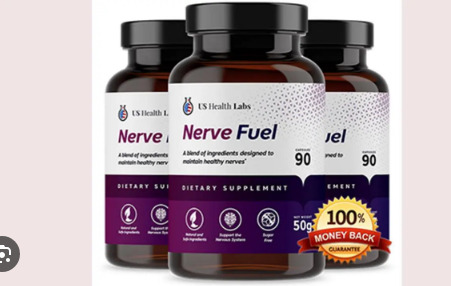
What is Nerve Fuel?
Nerve Fuel is a dietary supplement formulated to support nerve health and address symptoms related to nerve damage such as pain, tingling, and numbness. The product is typically marketed to those suffering from neuropathy or other nerve-related issues, which can be a result of conditions like diabetes, physical injuries, or nutritional deficiencies.
Key Ingredients and Their Functions
The effectiveness of any supplement hinges on its ingredients and their synergy. Nerve Fuel contains a blend of vitamins, minerals, and herbal extracts, each selected for their potential benefits to nerve health:
Alpha Lipoic Acid (ALA): Known for its antioxidant properties, ALA is believed to protect nerves from damage and improve nerve function.
Acetyl-L-Carnitine: This compound is thought to aid in nerve repair and reduce the pain associated with neuropathy.
Turmeric and Curcumin: Known for their anti-inflammatory properties, these ingredients can help reduce inflammation around nerves, potentially easing symptoms.
Vitamin B Complex: Essential for nerve health, B vitamins help maintain the protective covering of nerves and are crucial for nerve repair.
(SALE ISLIVE) CLICK HERE TO ORDER US Health Labs Nerve Fuel Get Upto 50 % Off On First Buy
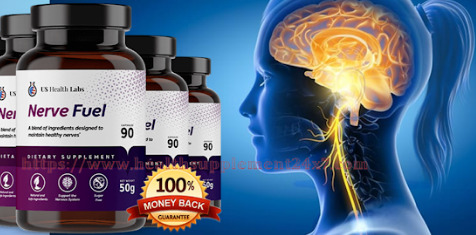
Efficacy of Nerve Fuel: What Do the Reviews Say?
To gauge the effectiveness of Nerve Fuel, it is essential to consider real-world feedback from those who have used the supplement. User reviews generally fall into the following categories:
Positive Reviews
Many users report significant improvements in their symptoms after using Nerve Fuel. Common themes include reduced pain and tingling in extremities, increased comfort during daily activities, and a general sense of improved well-being. These users often praise the supplement for its natural ingredient list and lack of significant side effects.
Neutral Reviews
Some users note a mild improvement in their symptoms but mention that the results were not as dramatic as they had hoped. This group often continues to use the product in combination with other treatments but remains on the fence about its overall impact.
Negative Reviews
A minority of reviewers report no change in their symptoms after using Nerve Fuel. In some cases, users experienced mild side effects such as gastrointestinal discomfort, which led them to discontinue use.
(SALE ISLIVE) CLICK HERE TO ORDER US Health Labs Nerve Fuel Get Upto 50 % Off On First Buy
Potential Side Effects
While Nerve Fuel is made from natural ingredients, and serious side effects are rare, some users might experience mild adverse reactions such as nausea, digestive issues, or allergic reactions to specific ingredients. It is always recommended to consult with a healthcare provider before starting any new supplement regimen, especially for those with pre-existing conditions or those taking other medications.
Where to Buy Nerve Fuel ?
Nerve Fuel is available for purchase from various retailers, including online stores, health food stores, and supplement distributors. It is essential to choose a reputable source to ensure the quality and authenticity of the product. When purchasing Nerve Fuel, carefully review the ingredient list, dosage recommendations, and customer reviews to make an informed decision. Some manufacturers may offer money-back guarantees or discounts for bulk purchases, providing added peace of mind for consumers.
Direct buy: https://www.pratibimbnews.com/a3ci
Official Website: https://www.pratibimbnews.com/nerve-fuel-reviews/
Pinterest: https://www.pinterest.com/holistichygienic/
Twitter: https://twitter.com/holistichygenic
0 notes
Text
Unveiling the Sweet Treasure: Exploring the Magic of Jaggery
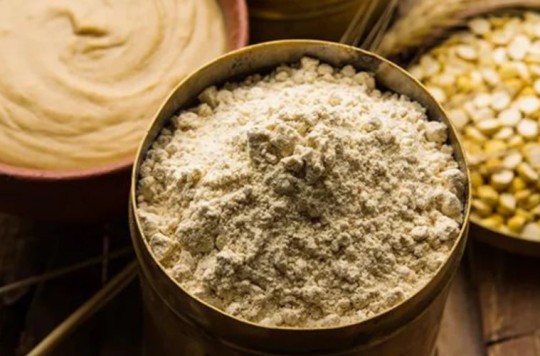
Introduction:
Jaggery, often dubbed as nature's sweetener, has been a beloved ingredient in kitchens across cultures for centuries. Derived from the sap of sugarcane or palm trees, jaggery boasts not only a rich, caramel-like flavor but also a plethora of health benefits. In this enlightening journey, we delve into the world of jaggery, uncovering its origins, nutritional properties, culinary uses, and the timeless allure behind this wholesome sweetener.
The Essence of Jaggery:
Tracing the Origins of Jaggery
Jaggery, known by various names such as gur, panela, or vellam, has a rich history steeped in tradition and cultural significance. Its origins can be traced back to ancient civilizations where it was prized for its natural sweetness and medicinal properties. In India, jaggery holds a revered place in Ayurveda, the ancient system of medicine, where it is valued for its holistic healing properties and as an essential ingredient in various remedies and tonics.
The Craft of Jaggery Making
The process of making jaggery is a time-honored tradition that involves boiling the sap of sugarcane or palm trees until it thickens and solidifies into a dense, unrefined sugar. Unlike refined sugar, which undergoes extensive processing and chemical treatments, jaggery retains its natural nutrients, including vitamins, minerals, and antioxidants. This traditional method of jaggery production not only preserves its nutritional integrity but also imparts a distinct flavor and aroma that sets it apart from other sweeteners.
Nutritional Benefits of Jaggery:
Nature's Nutrient Powerhouse
Jaggery is not just a source of sweetness but also a nutritional powerhouse packed with essential vitamins and minerals. It contains significant amounts of iron, potassium, magnesium, and calcium, along with vitamins A, B, and C. Its high iron content makes it especially beneficial for individuals with iron deficiency or anemia, while its potassium content supports heart health and regulates blood pressure. Moreover, the presence of antioxidants in jaggery helps neutralize free radicals and protect against oxidative stress, contributing to overall well-being.
Balancing Energy and Digestion
In Ayurveda, jaggery is revered for its ability to balance the doshas, or bodily energies, particularly Vata and Pitta. Its sweet taste and grounding properties help pacify Vata dosha, which governs movement and creativity, while its cooling nature soothes Pitta dosha, responsible for digestion and metabolism. Consuming jaggery in moderation can help regulate energy levels, promote digestion, and alleviate symptoms of digestive disorders such as acidity, bloating, and constipation.
Culinary Uses of Jaggery:
From Traditional Sweets to Savory Delicacies
Jaggery's versatility in the kitchen knows no bounds. In Indian cuisine, it is used to sweeten a wide array of traditional sweets and desserts, including ladoos, halwas, payasams, and chikkis. Its rich, caramel-like flavor adds depth and complexity to these indulgent treats, making them irresistible to the palate. Moreover, jaggery finds its way into savory dishes as well, where it is used to balance out spicy, tangy, and savory flavors in dishes like chutneys, sauces, and marinades.
Exploring Jaggery Varieties:
Diverse Flavors and Aromas
While sugarcane jaggery is the most common variety, jaggery can also be made from other sources such as palm sap, date palm, or coconut palm. Each variety of jaggery boasts its own unique flavor profile, aroma, and color, reflecting the local terrain, climate, and cultural traditions. Exploring these diverse jaggery varieties not only adds depth to culinary creations but also offers a glimpse into the rich tapestry of flavors and aromas found in different regions.
Conclusion:
In conclusion, jaggery stands as a testament to the timeless wisdom of traditional food practices and the bountiful gifts of nature. Its rich flavor, nutritional benefits, and versatile culinary uses make it a cherished ingredient in kitchens around the world. As we celebrate the sweetness of jaggery, let us embrace its wholesome goodness and honor the ancient traditions that have sustained generations of health and vitality.
FAQs:
Q1: Is jaggery healthier than refined sugar?
A1: Yes, jaggery is considered healthier than refined sugar as it retains more vitamins and minerals due to minimal processing. Additionally, jaggery has a lower glycemic index compared to refined sugar, resulting in slower blood sugar spikes and a more sustained energy release.
Q2: Can jaggery be used as a substitute for sugar in recipes?
A2: Yes, jaggery can be used as a substitute for sugar in most recipes, including desserts, beverages, and savory dishes. However, keep in mind that jaggery has a distinct flavor that may alter the taste of the final dish, so it's best to adjust the quantity according to your preference.
Q3: Is jaggery suitable for individuals with diabetes?
A3: While jaggery is often touted as a healthier alternative to refined sugar, it still contains sucrose and should be consumed in moderation by individuals with diabetes. It's advisable to consult a healthcare professional to determine the appropriate amount of jaggery to include in your diet.
Further Reading:
10 Amazing Health Benefits of Jaggery - Rural Treasures
0 notes